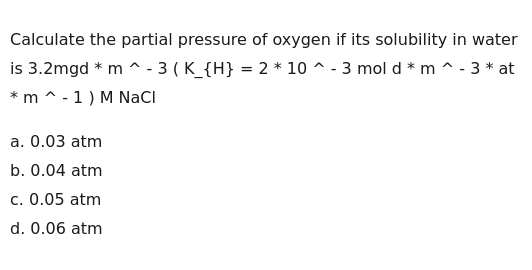Question
Question: Calculate the partial pressure of oxygen if its solubility in water is 3.2mgd * m ^ - 3 ( K_{H} = 2...
Calculate the partial pressure of oxygen if its solubility in water is 3.2mgd * m ^ - 3 ( K_{H} = 2 * 10 ^ - 3 mol d * m ^ - 3 * at * m ^ - 1 ) M NaCl

A
0.03 atm
B
0.04 atm
C
0.05 atm
D
0.06 atm
Answer
0.05 atm
Explanation
Solution
To calculate the partial pressure of oxygen, we use Henry's Law, which states that the solubility of a gas in a liquid is directly proportional to the partial pressure of the gas above the liquid. The formula for Henry's Law is:
C=kH∗p
Where:
- C is the solubility of the gas in the liquid
- kH is Henry's Law constant
- p is the partial pressure of the gas
Given:
- Solubility C=3.2mg/dm3=0.0032g/dm3
- Henry's Law constant kH=2×10−3mol/dm3atm
First, convert the solubility to moles per liter (mol/dm³):
Moles of O2=32g/mol0.0032g=0.0001mol/dm3Next, rearrange Henry's Law to solve for p:
p=kHC=2×10−3mol/dm3atm0.0001mol/dm3=0.05atmThus, the partial pressure of oxygen is 0.05 atm.
